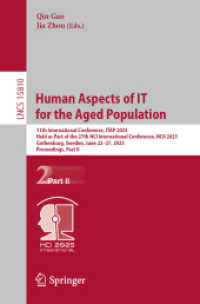Full Description
Public libraries have changed beyond anyone's predictions in the past ten years and are at a vital stage in their historical development. This timely book is the first standalone text to examine the role and services of the UK public library in the 21st century context.
The book discusses the nature and functions of the modern public library service, from its beginnings as the street-corner university, through its delivery of state-of-the-art services and beyond. At the heart of the book is a passionate argument for the professional and public significance of the public library service.
The key chapters are:
public libraries: the modern context
historical development of public libraries
equity of access
cultural and leisure roles
information, advice and informed citizenship
lifelong learning
the impact of ICT
management, governance and budgeting issues
performance measurement and evaluation
professional and staffing issues
marketing, branding and buildings
the public library of tomorrow.
Readership: Of interest to all students and researchers of library and information science, as well as professionals in public libraries, this book is an advocacy tool for an essential service consistently under pressure.
Contents
PART 1: THE PUBLIC LIBRARY: HISTORY AND MODERN CONTEXT 1. Public libraries: the modern context
Introduction
The 21st-century context
Government publications
The Coates Report
Research on public libraries
Service challenges
Conclusion
References
2. Historical development of public libraries in the UK
Introduction
The early antecedents
The public library movement
Moving to the Act
Early public library development
Philanthropy and growth
The McColvin Report and post-war developments
The modern statutory context
Conclusion
References
PART 2: SERVICE THEMES OF THE MODERN PUBLIC LIBRARY 3. Equity of access
Introduction
Core values
Censorship
Enabling equitable access to materials
Social inclusion
Public library users
Reaching excluded users
Impact of library closures and reduced opening hours
Conclusion
References
4. Cultural and leisure roles
Introduction
Culture or leisure?
Borrowing of books in practice
Promotion of literacy and reading
Children and young people's services
Music, films and other media
Conclusion
References
5. Information, advice and informed citizenship
Introduction
Information types
Ethics of information - any question answered?
Reference services
Virtual reference services
Guidelines for reference and information services
Informed citizenship
Community information
Business information
Heritage and digitization services
Genealogy services
Information after civil disasters
Web services
Conclusion
References
6. Lifelong learning
Introduction
What is lifelong learning?
The public library and learning
UK policy background
Literacy and ICT literacy
Public library initiatives
Conclusion
References
PART 3: ISSUES IN MANAGEMENT AND SERVICE DEVELOPMENT 7. The impact of information and communications technology
Introduction
Understanding the use of technology in libraries
The People's Network
Public access computing
Technology-enhanced services
Conclusion
References
8. Management, governance and budgeting issues
Introduction
Local authorities
Local government reorganization
Budgets
Cultural change in management and service delivery
Leadership and management trends
Emergence of managerialism
Conclusion
References
9. Performance measurement and evaluation
Introduction
Performance measurement
Modes of measurement
Measurement of public library services
Performance indicators in UK libraries
Measurement of Scottish public libraries
Measuring economic value
The consequences of performance measurement
Conclusion
References
10. Professional and staffing issues
Introduction
The local authority staffing structure
Professional issues
Ethical issues
Professional vs paraprofessional
Nature of working
Hierarchy of needs
Conclusion
References
11. Marketing, branding and buildings
Introduction
Marketing public libraries
Attracting users
Mission statements
Branding and rebranding
Challenges in infrastructure and location
Conclusion
References
12. Conclusion: the public library of tomorrow
Introduction
Public libraries: an outdated concept?
Revisiting service themes
Predictions of demise
Public libraries: lessons from retail?
The equity and excellence debate
Public libraries and ICTs
Education of public librarians
The public library and librarian of the future
Conclusion
References
Selected reading








